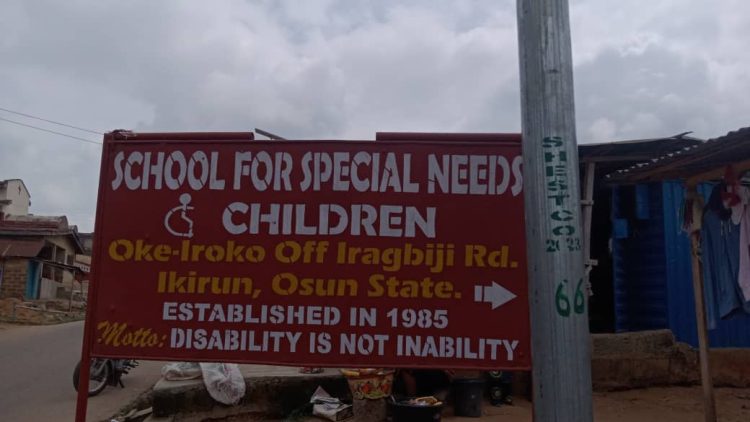
When Adewale Rofiat Mayowa, a Blind mother of three, was employed by the Osun State Government to teach at the School for Special Needs in Osogbo in 2022, her joy knew no bounds.
The 35-year-old mother of 3 from Osogbo had long anticipated this moment; the chance to contribute to the education of children with disabilities while securing a livelihood for her young family.
But that joy was painfully short-lived. With the inauguration of Governor Ademola Adeleke came a sweeping decision that changed everything. All employed teachers, including Rofiat, were dismissed in one fell swoop, their dreams crushed overnight.
“I had waited for this opportunity for so long,” Rofiat said softly, her voice heavy with the weight of disappointment. “But it didn’t last. We were sacked because the immediate past administration of Gov Gboyega Oyetola employed us. No one considered what this would do to our lives.”
Her voice faltered as she described the impact of that decision. Despite her blindness, she had tirelessly worked alongside her colleagues. For five long months, she taught without receiving a fee, as the promise Governor Oyetola made to the 61 staff members, including her, never materialized into payroll inclusion. “I was just managing myself,” she recalled. “My husband had to foot most of the expenses.”
Rofiat’s dismissal has had devastating consequences on her. Her small business, which sells provisions, was already struggling, and the little she earned from it had been funneled into transportation to the school and other family expenses. “Our being sacked affected my business too. I always used money from my business to make ends meet,” she explains.
Her voice grew quieter as she spoke of her husband. “We manage the petty business I run, but it’s tough. He’s dealing with house issues; our rent has expired, and we don’t know where the next money will come from.”
According to her, what she desires most now, is for Governor Adeleke to intervene, especially in the payment of the arrears they are owed.
“I hope the governor hears us. We worked, we gave our best, and we deserve to be treated better.”
The Genesis
A day after his inauguration as Osun State Governor, Ademola Adeleke issued six Executive Orders, one of which nullified the employment of all workers hired by his predecessor, Gboyega Oyetola, after he lost his re-election.
Among those affected were 61 persons with disabilities (PWD), who were part of the sacked teachers. The group has since raised concerns, alleging threats to their lives over their protests.
According to a statement by Adeleke’s spokesperson, Olawale Rasheed, the Executive Orders addressed various issues, including chieftaincy matters, appointments, the establishment of a review panel, staff audits, and employment decisions.
However, Persons with Disabilities (PWDs) in Osun State have voiced concerns in different reports over their exclusion from governance, calling on Governor Ademola Adeleke to prioritize their inclusion and improve the well-being of vulnerable groups in the state.
A few months after the dismissal of 1,500 teachers by Osun State Governor Ademola Adeleke late last year, reports emerged that four of the affected teachers had died, allegedly due to depression.
Non-implementation of disability laws
Persons with Disabilities (PWDs) in Nigeria face significant challenges, including societal stigma, limited access to education, healthcare, and employment, as well as poor infrastructure that does not accommodate their needs.
In 2019, Nigeria made a significant step by enacting the Discrimination Against Persons with Disabilities (Prohibition) Act, which aims to improve the welfare of PWDs by outlawing discrimination and providing a framework for the inclusion of PWDs in various sectors. However, despite the law’s existence, the implementation has been slow and inadequate, leaving millions of PWDs underserved, especially in rural areas.
In Osun State, PWDs face similar barriers. Despite advocacy efforts, meaningful inclusion in governance, education, and employment remains limited.
The Osun State Disability Bill, which was passed to promote the rights of PWDs, has not been fully implemented, and the lack of political will has left many PWDs without the support they need.
Jobless and Hopeless
Mr. Ayeola Kamarudeen’s life took a dark turn after his dismissal from the Osogbo School for Special People, Powerline.
As a trained teacher, his journey had begun with despair. “I’ve been jobless and unhappy since I graduated 6 years ago, he lamented.
Despite his dedication, Ayeola’s efforts to secure a permanent position failed. “All my efforts to make my teaching profession permanent has proved abortive,” he explained.
His frustration deepened when Governor Oyetola did not offer him a permanent role, and his attempt to reapply under Governor Adeleke yielded no results.
Left without a job, Ayeola faced the harsh reality of trying to feed his two children. “Feeding them has been hard,” he admitted. “A friend often assists financially when I’m stranded.” His children attended a public primary school, but it wasn’t the life he had envisioned for them.
From Hope to Despair
Omokanye Abiodun Olakunle, from Okuku, Odo-Otin LGA, recalled how his joy turned to despair after being sacked from his teaching job at the School for Special Needs, Ikirun. “When I received the appointment letter from Governor Oyetola, I was very happy and hoped to start a new chapter in my life,” he recounted.

That hope quickly dissolved when Governor Adeleke came into power and annulled their appointments.
Omokanye found himself returning to hard labor just to survive. He began working as a security guard, earning a meagre amount of N15,000 monthly. “The security work is just managing me,” he said with resignation.
He clung to the hope that one day the government would reappoint him, but until then, survival meant enduring this meagre income.
For Omokanye, his experience during the recruitment process as a Deaf person was particularly painful. “I was called for an interview, but there was no sign language interpreter,” he recalled. Being Deaf, he had no way to effectively communicate, leading to yet another missed opportunity. “I wanted the government to provide interpreters during interviews,” he said.
Despite this, he remained vocal about the need for better treatment of people with disabilities. He urged the government to provide employment, empowerment, and financial assistance for those like him, who had been sidelined and neglected.

Babawale Simeon Obasanjo, a 36-year-old from Ejigbo LGA, had only worked at the Primary School for the Handicapped for three months before Governor Adeleke’s administration sacked him. “I wasn’t paid for the three months I worked before being dismissed,” he said. Left with no source of income, Babawale turned to farming just to get by.
“I had to manage by farming and doing manual labor to care for myself and my family,” Babawale shared.
Despite graduating from the University of Ilorin in August 2024, his dreams of a brighter future had crumbled under the weight of unemployment. “Life wasn’t easy; I depended on myself, working hard from secondary school to university, but without enough support.”
Denied Opportunities
Babawale, who also served as the Chairman of the Osun State Association of the Deaf, Osun Chapter was particularly heartbroken by the systemic challenges faced by people with disabilities.
Babawale believed the government needed to address these disparities by providing not just teaching jobs but also other forms of employment for people with disabilities. “We need empowerment programs and financial assistance,” he urged, calling for better inclusion in the workforce.
One of the affected teachers in Osogbo, who requested to be anonymous, also spoke about the financial strain they faced after being sacked. “I didn’t get a job immediately after the dismissal, so I started making bags to survive,” they explained. But even that small business was barely enough to get by, especially after spending money on transportation for work that never materialized.
Now working at a private school, she shared the deep frustration of trying to rebuild their life after losing a stable job. “I felt stuck, unhappy, and unsure of the future,” they admitted, a sentiment echoed by many of their peers.
Cry for Equality and Support
For Mr. Ayeola, Omokanye, Babawale, and others like them, the government’s failure to provide permanent employment has left them grappling with a bleak future.
Omokanye’s call for greater inclusion during recruitment processes and other members of the Deaf community.
They have been denied equal opportunities simply because the necessary support, such as interpreters, was not provided. “The government must do better for people with disabilities,” Omokanye insisted.
Their plea for fairness is not just about employment but about being treated with dignity. “We deserve empowerment, training programs, and financial support,” Babawale added. For him, and others with disabilities, employment should be more than just a chance at survival, it should be an opportunity to thrive.
Expert Calls for Transparent Recruitment and Skill Enhancement for PWDs
Yinka Olaito, Executive Director of the Centre for Disability and Inclusion Africa, provided an expert perspective on the dismissal of Persons with Disabilities (PWDs) in Osun State, emphasizing the need for transparency and fairness in recruitment processes.
“I have done my findings and discovered that many of those who were sacked did not meet the basic qualifications for the positions they held. Several of them did not pass the entrance exam,” Olaito explained.
While acknowledging the importance of providing reasonable accommodations for PWDs, Olaito stressed that excellence should remain the standard for employment. “If the recruitment process did not make reasonable accommodations for them to pass the exam, then there should be a new, transparent process that can improve their chances. But if the process was not flawed, I believe they should focus on enhancing their personal efficiency.”
He added that organizations like his are ready to support such efforts, noting, “Everyone should be offered opportunities based on their capacity to deliver.”
Osun PWD Chairman Reacts
While reacting to the dismissal of teachers with disabilities by the Osun State government, Stephen Oluwafemi, the state chairman of the Joint National Association of Persons with Disabilities (JONAPWD), called on the government to prioritize the employment of persons with disabilities in the state.
Oluwafemi expressed concern over the situation, noting that people with disabilities face unique challenges in securing jobs. “We want the governor to not only consider reinstating the sacked teachers but also create more job opportunities for persons with disabilities beyond teaching,” he said. “Other states around us have job quotas for persons with disabilities, and we want the same in Osun. Any job that our people are qualified for should be provided, according to their skills and qualifications.”
He further urged the government to uphold the rights of persons with disabilities, ensuring they have access to gainful employment to improve their quality of life.
Lawmaker Reacts
In an interview with BONews, Hon Adewumi Adeyemi, the legislator representing Obokun Constituency at the Osun State House of Assembly, expressed his commitment to creating employment opportunities for Persons with Disabilities (PWDs) through the Disability Act that he had proposed.
He also explained the reasons behind the recent dismissal of teachers, including 61 PWDs.
Adewumi noted that the governor sacked the teachers to ensure a proper recruitment process. “The governor is considerate and lenient. He only sacked the teachers, including the 61 PWDs, to ensure due recruitment processes are followed. The recruitment is ongoing, and anyone qualified will be selected,” he said.
Addressing the Disability Act, which is now law in Osun State, Adewumi explained that it prohibits discrimination against PWDs and mandates a quota for them during government hiring. “This ensures equity, so no one is excluded simply because they live with a disability,” he added.
The law also criminalizes dismissing employees based on disability and provides guidelines to retain workers who become disabled while on the job. “It’s about ensuring that those who can vote and contribute should also benefit from government programs,” Adeyemi emphasized.
This report was produced with support from the Civic Media Lab as part of its Grassroot News reporting Project (GNP) 3.0